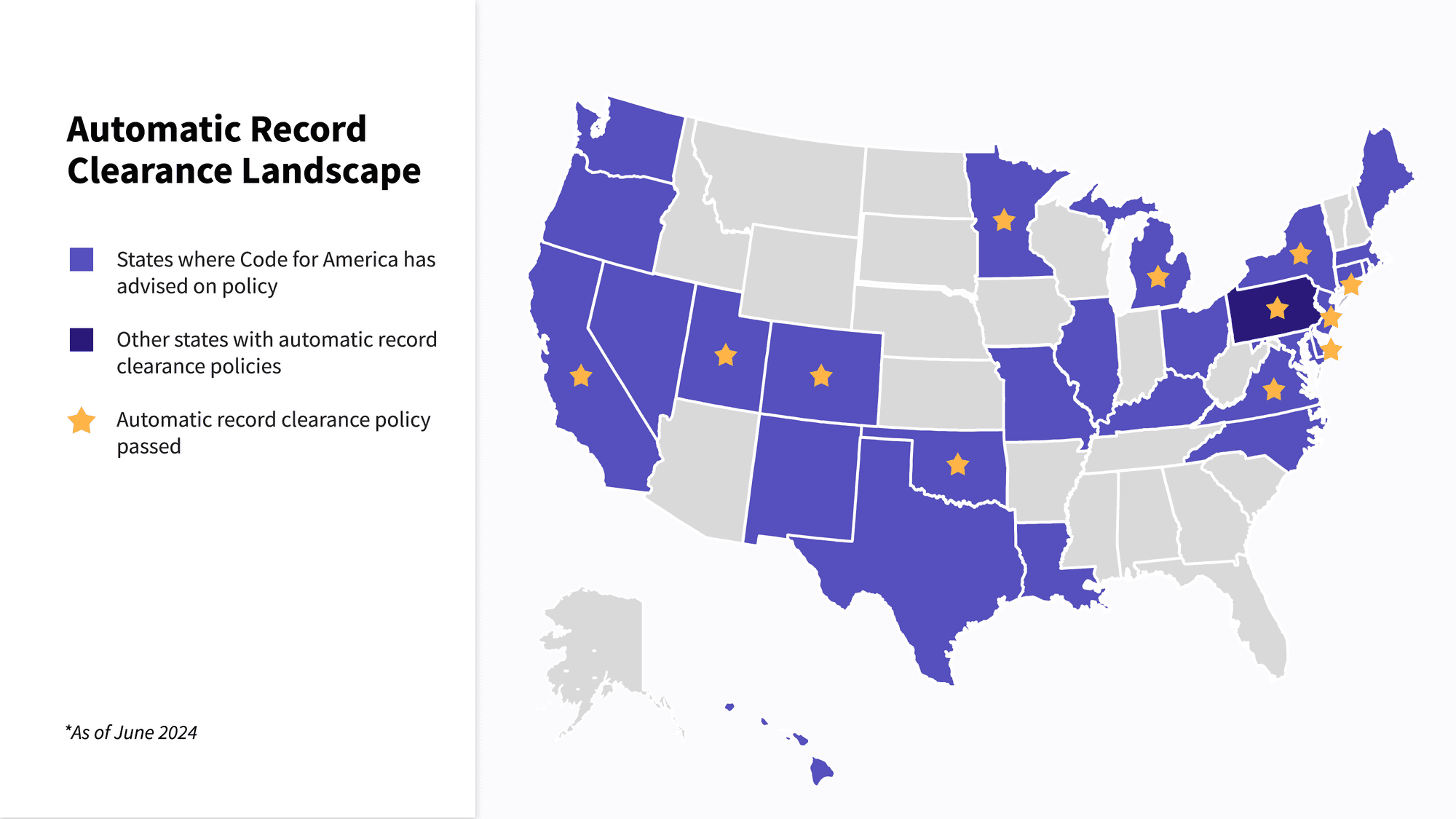Impact
- We’ve worked with advocates and governments in over 20 states, including Colorado, Oklahoma, and Michigan, to build automatic record clearance policies that integrate technical expertise and best practices into the law before it gets passed, ensuring a policy is more likely to be passed and can be implemented effectively when it goes into effect.
- We take into account government’s technology and data availability to help surface and solve implementation problems before they happen.
The challenge
A criminal record can be a lifetime barrier to housing, education opportunities, and career advancement. Traditional record clearance laws rely on petition-based processes that put the onus of clearing a record on the person with the record.
These types of processes are costly for individuals and time-consuming for people working in state governments who have to manually clear records submitted for expungement. Less than 10% of eligible people actually clear their records through petition-based systems—in other words, these systems leave 90% of eligible people behind.
We know there’s a better way. With automatic record clearance—also known as “Clean Slate laws”—people’s records are cleared automatically by their government, as soon as they’re eligible under the law. States across the country are now passing laws that make this a reality. But, we don’t want to pass just any law – a policy is only successful if it’s designed in a way that prioritizes effective technical implementation. That’s where we come in.
Our approach
In our work with state agencies, lawmakers, and policy advocates, we’ve seen what works and what doesn’t. We help during the policy design phase to craft a policy that government agencies can successfully implement once it’s passed. Alongside the people doing this work day-in and day-out, we surface and solve for data management challenges, technical constraints, and business process concerns to make sure that everyone is prepared to make the shift to automatic record clearance—because we know a policy won’t work unless the people responsible for implementing it are confident in their ability to do so.

When working with states to craft policy, we focus on two things:
- Integrating technical best practices in new policies: We’ve developed technical best practices for Clean Slate legislation and we incorporate these into early drafts of automatic record clearance legislation.
- Designing policy solutions that take into account government technology and data availability: Criminal legal system agencies use a wide variety of systems to keep criminal records, and the data in them is often piecemeal and outdated—but that doesn’t mean it can’t be the foundation of a working automatic record clearance process. We work with government agencies to learn how their systems work, where relevant data “lives,” and how systems interact with each other. We then use this information to help design policies that can work in the real world.
Throughout the process, we review proposed bills for technical implementation challenges, evaluate external stakeholders’ feedback about the bill, create talking points for how to discuss technical aspects of the automatic record clearance policy, and provide demos to government agencies showing technical solutions to possible implementation challenges.
Our goal is to ensure that automatic record clearance policies that go into effect are effective and help as many people as possible, with an eye towards equity and a focus on marginalized communities that have been most deeply impacted by disparities in the criminal legal system. A record clearance policy—even if it’s automatic—won’t do much good if its eligibility is narrow or its process is so complex that government agencies can’t implement it on a meaningful timeline. A good record clearance policy fulfills the promises set out in legislation.
Outcomes
We started this work in California, where our record clearance pilot that began with five counties grew to eventually help counties statewide facilitate the reduction, dismissal, or sealing of 144,000 cannabis convictions. Since then, we’ve worked with 20 other states to help pass technically feasible policies that will impact millions of people. With each record cleared, a person can now apply for housing assistance, get a job at a place that runs background checks, and live their lives more fully.
With the right policies and the mindful use of technology, government can deliver this kind of impact at the scale we need to meet the moment. Every state that successfully proves that this can be done sets an example for more states to follow.
Read more
Let’s work together to improve government in meaningful ways
